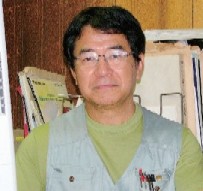
By Shigeo Otsubo (Chair, Alumni Associationof the Doshisha Student)

★Why write in English? (なぜ英語でなの)
How do you read the following formula? (式)
① 2+3=5
: Two plus three equals five (easy to understand for Japanese)
: Two and three is five (easy for native children)
② 2×3=6
:Two multiplied by three equals six (easy for Japanese)
:Two threes make six (not easy for Japanese)
③ 12÷4=3
:Twelve divided by four equals three (easy)
:Four into twelve is three (not easy)
④7-5=2
:Seven minus five is two (easy) (他に、どう読みますか?)
Now let me ask you a question. (さて質問です) How can you read it differently?
The answer is five from seven is two. I think 5 is the main object(主なる対象物), and 7 is circumstance in their brain(欧米人の考え方の中では).To Westerners,“I” and “my idea” come first. They are usually clear in their opinions of for or against, pro- or anti- and like or dislike.
They would say “today is March 20, 2008 and I live in Karasuma, Imadegawa, Kitaku, Kyoto, Japan. They usually start from the place they are and move to the world around them. Another example would be how they say “I don’t think he is a Doshishan”, but people would rarely say “I think he is not a Doshishan.” By using a foreign language, we are requested to express our opinions clearly. English is a language in which it is difficult to say something ambiguously, especially for us Japanese.
★Why should it be newspaper-style?
Do you know the technical term “inverted pyramid”(ニュースバリューの逆三角形) for the newspaper writing? “Diminishing importance ” (文頭ほど重要)is the principle used in writing the news. The most important contents should come first and circumstances or situations should come up later because the reader may stop reading at any time. To make your sentence brief, clear and substantial is not an easy job. Just thinking in your mind is not enough. One must learn how to communicate your opinion to others by public speaking and public writing. Try to seek original points and avoid banality (紋切り型). International goodwill should be at the base of our own opinion.
Fluent and colloquial conversation with foreigners is popular. But after the daily chat, we sit at a desk. We have time to write. It is good to be slow and steady to make your thinking reliable, as it is good for your health. (…があなたの健康によいように)
We OB’s (alumni) are very happy to see the revival of The Doshisha English Newspaper Press Club, which was originally founded in 1959. Becoming independent of ESS, it ended up disappearing in 1999. The temperament (気質) of students has naturally changed from the political atmosphere(政治の季節=60年安保、学園紛争=70年代)of the U.S.-Japan Security Treaty disputes in1960 and campus disputes in the 1970's. Japan EXPO & the bubble economy between the 70s to 90s was followed by the so-called the lost ten years.(失われた10年) We OB’s (in our 60’s), called the baby-boomer-generation, are now retiring from our offices. We still have a dream to associate with the younger generations and students. Yes, we believe we can communicate. And it will be more effective and significant to have mutual understanding over the generations when we make a campus paper with them in English.